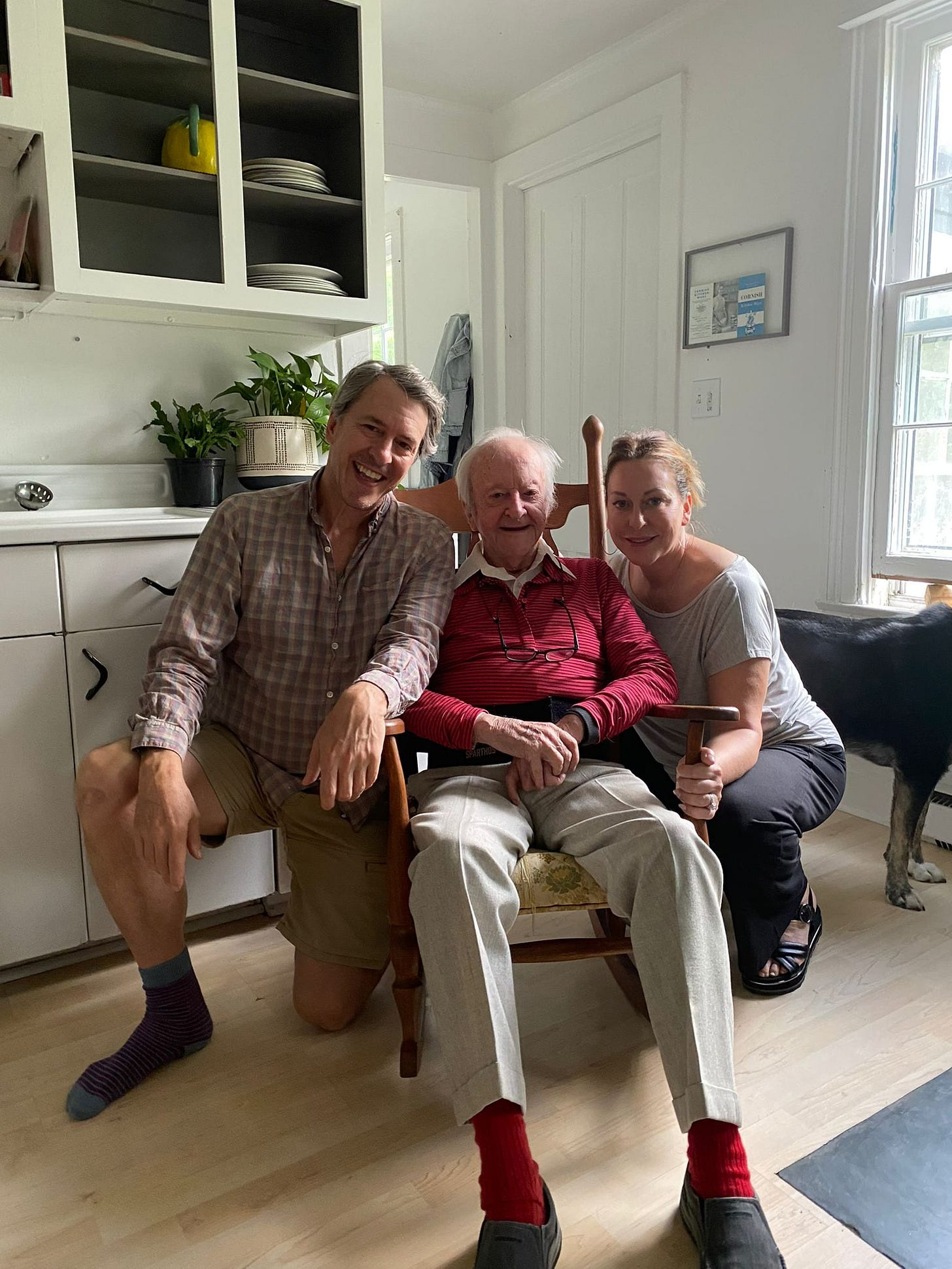This post, which you can watch in the video or read here, is partly about the fact that my father died.
And it's partly about a story to do with forgiving myself.
I know the title suggests my father died and I am forgiving myself for that. Really, it's about two separate things.
But my macabre sense of humor thought it was funny to say my father died and I forgive myself as though they're connected but they're not (well, actually they kind of are but you can infer how for yourself).
I'm going to talk about my dad dying second. I'm going to talk about something else first, which is my email inbox.
I hate email…
So I had about 6,000 unread emails.
And the thing is, every single time I opened my email, I would feel guilty.
Like: Oh, there must be people in there that are waiting for me to respond, or there's probably an opportunity in there that I'm missing, or I'm disappointing somebody.
Every time I opened my email, it would be 6,000 unread emails. It would just make me feel bad. It would make me feel so bad.
So, I was like, what can I do? I could get AI to go through my email to figure it out, or I'll filter it, or I'll do this, or I was just like, what can I do?
So, I was talking to my coach about it. And she told me one way to get to inbox zero.
“It's like this: You press select all, and then you press delete.”
“Wait, just delete all my emails?”
And she was like: “Yeah!”
And I was like: “What about archiving?”
She said: “That'll do. I'd delete them, but you could archive them.”
And she continued: I have 19,000 unread emails. But it doesn't bother me. When I open my email inbox and they're sitting there, it doesn't bother me.
But me, Colin, it really bothers me.
So I did.
I opened my email inbox.
I clicked select all.
And then I clicked: Archive.
Never to be looked at or seen again.
A Story of Forgiveness
Now you might be wondering what that has to do with forgiving myself. I’ll get to that.
But first, my dad.
I posted a Substack post about a month ago that was called The Prospect of Orphanhood because my dad had injured himself and he was in the hospital and we thought he might die.
But he was in the hospital for a month and it was like up and down and up and down.
He was getting better, but he got worse. But he was getting better, but he got worse. It was like that…
Then about 10 days ago he died. So when he went to hospital some members of my family wanted to be with him all the time and felt that there should be somebody with him all the time.
I had other responsibilities. I'm not a victim. I made a very clear choice. I was like, I am going to be there at the hospital with him when it's important for me to be there. Not when it's important for someone to be there, but when it's important specifically for me to be there.
So, I went there for several visits and I stayed overnight several times, but in there were three actual occasions, it turned out, when it was important for me to be there.
Maybe there were other occasions where it would have been important for me to be there—I don’t know—but I set this intention: I will be there when it's important for me to be there.
And I feel like I was there on the times when it was important for me to be there.
I don't really want to talk that much about this, but I'm going to tell you in reverse order the three times. I'm only going to tell you in detail about one.
The Final Breath
I was there when he died.
I was there with my lovely ex-wife, Michelle, who's like a best friend. She was there. And then my daughter, Bella, had FaceTimed in. And then my sister, Susan, and her daughter, Riley, FaceTimed in. And my dad was asleep, and they took the forced oxygen off him, and he just quietly stopped breathing. And we were all there together.
That was one of the three times it was important for me to be there. And I reassured him and held him and told him it would be okay and all of the things.

There to make his orders heard.
Another time it was important to be there was when the doctor came in and said to him:
“There is a chance we will have to intubate you, put a tube down your throat, and I need to know what you want to do. If that happens, you won't be conscious and you won't be able to tell us what you want, so I have to ask you now.”
And my dad said no. He didn't want that. But he said it quietly, and it was hard for him to be heard and understood.
And so the second time it was important to be there was to help him make himself understood when he made his do not resuscitate order.
So that was another time and a hard time when it was important to be there.
“Why is this happening to me?”
But the first time it was important to be there is the one I want to talk about.
Early on, in the hospital, he was in a lot of pain.
He kept asking, “Why is this happening to me?”
People would explain: “Keith, you fell. You broke a rib. It punctured your lung. There’s fluid in your lung. That’s why you’re here.”
Five minutes later: “Why is this happening to me?”
Again, they’d explain.
And again. Over and over.
Everyone thought he was confused.
But eventually, it was just the two of us. He said again, “Why is this happening to me?”
And I said, “Poppie, I don’t understand what you don’t understand. We’ve explained this to you several times.”
He said: “Why is this happening to me? I didn’t do anything.”
I said, “Wait, do you feel like you’re being punished?”
And he said, “Yes. I’m being punished. Why am I being punished?”
I said, “Poppie, you’re not being punished. You’re 93. You’ve lived so many years. Loved so many people. They’ve loved you. You’ve had amazing experiences. This is just what happens at the end of all of that. We all get old. We all get sick. We all die. It’s not being done to you. It’s part of life. It’s part of living.”
He said, “Okay.”
And it's interesting because I didn't know if that would be reassuring. It would be for me. That all the terrible things that happen and all the beautiful things that happen are not separable, right? They come together. They are one. And to me, that's a consolation.
I didn't know it would be a consolation to him, but I think it was because he never again asked, why am I here?
Anyway, those are the stories about my dad.
Back to the Inbox
So... back to the email.
I hate email. I'm so bad at it. I look at it. I forget to answer it. I start to answer it. I get distracted. I just… I don't like email.
In fact, the other day I was on a Zoom call with a group of people from my Zen tradition and somebody said, oh, could you send me such and such a document on the Zoom call? And I said to her:
“Listen, I'm going to tell you something. I really want to send you that document. You asked me for it and I want to accede to your request. I do want to send it to you. I do.
“But I'm going to tell you something. No matter where I write it down, if I write it down on a piece of paper, if I email myself, the chances are very high that I am going to not send it to you.
“I'm telling you, I want to send it to you. I like you. I want to send it to you. But I probably will not unless you nag me. You need to text me and ask me to send it. And then if I don't send it, you need to text me again.”
In other words, I really forgave myself for the fact that I'm not so organized. And I told her, I was really nice about it, I do want to do it, but my brain doesn't work that way. So you're going to have to help me. If you want me to do that for you, you're going to have to help me do it.
And because I forgave myself for my disorganization, I can help other people to understand how to help me help them.
And because I forgive myself for my disorganization, I could just completely delete the 6,000 emails and know that if it's really important, people will email me back.
And I'm sorry, but I'm disorganized. And I forgive myself.
Leaning Into Strengths
As it happens, I'm really good in a crisis. I'm good at having conversations with people who are dying. I'm good at having conversations with clients when the chips are really down. I'm good at helping people get through things.
And I'm no good at some of these organizational tasks. And for me, I choose to spend my time doing what I'm good at and what I feel really helps. And not trying to get better at the stuff that I'm no good at.
Life is short. Instead of spending hours and hours making myself feel bad and trying and never having success at the things that I'm no good at, why not get rid of them so I can spend more time at the things that I'm really good at and really help people?
And to do that, I have to forgive myself. I just forgive myself for my limitations and I move into my strengths.
That’s why this post is called: My Dad Died and I Forgive Myself.
With love,
Colin
👇 Let's Talk
Today, I’d love for us to talk in the comments about forgiving ourselves. Not just in grief, but in the everyday imperfections. What do you forgive yourself for? What would it take to forgive a little more? Let me know in comments below.
PS. Like what I write? Consider supporting my work.
Like what you read? This newsletter exists because of readers like you. Subscribe to get weekly reflections on life, leadership, and living fully. All posts are free, but if you can, please consider becoming a Paying Member. Your support keeps this space alive and free for everyone.
If you can afford it, think of it as buying me a coffee once a month. It makes all the difference.
Thank you for being here! Like what I write? Please like, comment, and share this post with friends.







